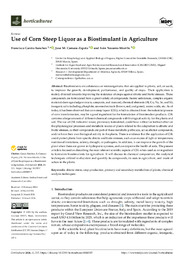Resumen :
Biostimulants are substances or microorganisms that are applied to plants, soil, or seeds, to improve the growth, development, performance, and quality of crops. Their application is mainly directed towards improving the resistance of crops against abiotic and biotic stresses. These compounds are formulated from a great variety of compounds: humic substances, complex organic materials (sewage sludge extracts, composts, and manure), chemical elements (Al, Co, Na, Se, and Si), inorganic salts including phosphite, seaweed extracts (brown, red, and green), amino acids, etc. As of today, it has been observed that corn steep liquor (CSL), which is obtained from the industrial process of corn transformation, may be a good ingredient for the formulation of biostimulant products. CSL contains a large amount of different chemical compounds with biological activity for the plants and soil. The use of CSL industrial waste, previously formulated, could have a direct or indirect effect on the physiological processes and metabolic routes of plants related to the adaptation to abiotic and biotic stresses, as their compounds are part of these metabolic pathways, act as elicitor compounds, and/or have their own biological activity in the plants. There is evidence that the application of CSL could protect plants from specific abiotic and biotic stresses, such as an excess of light or temperature, nutritional limitations, salinity, drought, or pathogens. In addition, it can improve the growth of the plant when these are grown in hydroponic systems, and can improve the health of soils. The present article is focused on describing the most relevant scientific aspects of CSL when used as an ingredient to formulate biostimulants for agriculture. It will discuss its chemical composition, the analytical techniques utilized to elucidate and quantify its compounds, its uses in agriculture, and mode of action in the plants
|

 La licencia se describe como: Atribución-NonComercial-NoDerivada 4.0 Internacional.
La licencia se describe como: Atribución-NonComercial-NoDerivada 4.0 Internacional.
.png)